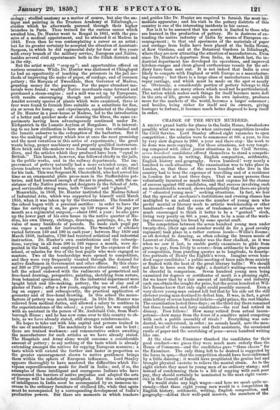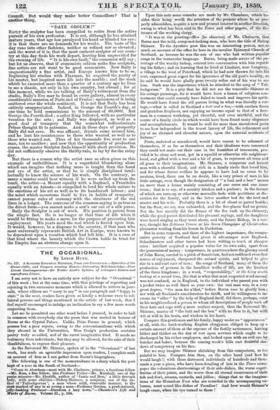CHARGE OF THE SEVEN HITNDRED.
A RECENT grand battle for places in the India House, foreshadows possibly what we may come to when universal competition invades the Civil Service. Lord Stanley offered eight vacancies to open competition ; the salaries were to commence at 801. a year, to rise by very slow degrees to 2001. a year and there stop : the work to be done was mere copying. For these situations, not very tempt- ing compared with other junior situations in the Civil Service, seven hundred candidates offered themselves to stand a competi- tive examination in writing, English composition, arithmetic, English history and geography. Seven hundred I very nearly. a hundred to each situation. The examination was to take place in London, so that those of the seven hundred who live in the country had to bear the expenses of travelling and of a residence in London for at least three days. That so many persons thus voluntarily incurred so much trouble and expense for the chance of success against 692 candidates, and that success involving such an inconsiderable reward, shows indisputably that there are plenty of " educated young men" seeking situations. In fact, we fear that the spread of mechanic's institutions and evening classes has multiplied to an actual excess the number of young men who prefer mental or literary work to artistic workmanship or other handicraft—and that the sons of tradesmen or artisans are too much encouraged to think it better to be a " genteel " clerk, living very poorly on 801. a year, than to be a man of the work- ing classes earning his bread by some special craft.
The competition between the seven hundred young men under twenty-five (their age and number would do for a cavalry
regiment) took place in a rather curious locale—Willis's Rooms; so oft devoted to dancing, so often echoing the brazen music of Laurent or Jullien. We wonder was the floor chalked, as it was when we saw it last, to enable portly examiners to glide from grave to gay, from lively to severe—from arithmetic to the graces of composition, from puzzling queries as to longitude, to descrip- tive portraits of Henry the Eighth's wives. Imagine seven hun- dred eager candidates! a public meeting of faces pale from anxiety or flushed with the heat of the great literary battle ! We should not like to have seen the sight ; a dentist's waiting-room would be cheerful in comparison. Seven hundred young men being examined for degrees or certificates of merit is a pleasing sight, for we know that by a fair amount of intelligence and industry each can obtain the sought-for prize, but the seven hundred at Wil- lis's Rooms knew that only eight could possibly succeed. Even a very clever young man cannot tell but that by his aide sat the still cleverer young man destined to defeat him. It was, in fact, a great state lottery of seven hundred tickets--eight prizes, the rest blanks. The examination lasted three days ; on the third day there remained but three hundred and forty candidates—the rest had retired in dismay. 'Poor fellows ! How many retired from actual incom- petence—how many from the fever of a sensitive mind competing with such a public assembly of rivals ? Everything was con- ducted, we understand, in order ; no sounds heard, save the mea- sured tread of the examiners and their assistants, the occasional rustle of paper and the scratching of pens—seven hundred writing like one.
At the close the Examiner thanked the candidates for their good conduct—we guess they were much more orderly than the House of Commons—and the candidates gave "three cheers" for the Examiner. The only thing left to be desired is suggested by the locus in quo,—that the competition should have been enlivened by a little dancing ; it would have propitiated the genius loci and brought physical exercise to relieve the mental strain. As to the eight victors they must be young men of no ordinary stamp ; and instead of condemning them to a life of copying with such poor pay, they should certainly be nominated to the next eight vacan- cies in the Council of India.
We would stake any high wager—and here we speak quite se- riously—that these eight young men would in a competition in English history, arithmetic, writing, English composition, and geography—defeat their well-paid masters, the members of the
Council. But would they make better Councillors? That is another thing.



























 Previous page
Previous page